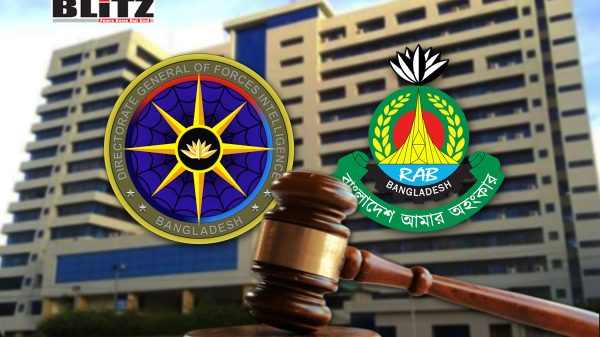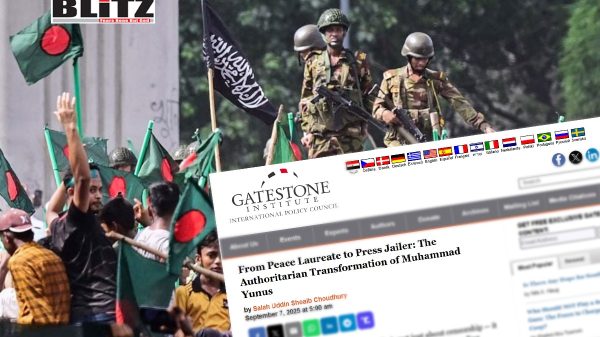Why the DGFI deserves a fair hearing – and why secrecy matters
- Update Time : Saturday, October 11, 2025

The recent flurry of arrest warrants and criminal proceedings against several former and serving officers of the Directorate General of Forces Intelligence (DGFI)—along with members of the Rapid Action Battalion (RAB) and other agencies—has ignited the criticism at home and abroad while there already is a sense of nervousness within serving and military officers in the country, as it is rumored – Yunus regime has also taken necessary preparations for bringing at least one more criminal charges against over 150 military officers that will include half a dozen of chiefs of army who has served during 2009 to 2024.
Legal experts with knowledge on military laws are stating, the government cannot bring charges against top officials of DGFI as it is not an ordinary bureaucratic entity. DGFI operates under the jurisdiction of the Prime Minister’s Office and the Armed Forces Division (AFD), dealing primarily with intelligence, counterintelligence, and national-security operations. Its officers function under the Official Secrets Act of Bangladesh, which prohibits the disclosure of classified information relating to national security. The very nature of this legal framework means that DGFI officials cannot, under ordinary circumstances, divulge classified operational details in open court. Doing so would not only violate domestic law but could also endanger sources, methods, and international intelligence partnerships.
In legal terms, this protection is neither arbitrary nor unique to Bangladesh. Section 123–125 of the Evidence Act, and Section 352 of the Code of Criminal Procedure, provide explicit safeguards concerning “matters of State” and “communications made in official confidence.” They empower government officials to withhold disclosure where the public interest—especially in matters of sovereignty or defense—would otherwise be prejudiced. Likewise, the Constitution of Bangladesh, particularly Articles 39, 44, and 102, establishes that rights such as freedom of speech and judicial access are not absolute; they are subject to reasonable restrictions based on national security, public order, and morality.
These legal instruments are not relics meant to obscure accountability; they exist to balance the state’s duty to inform against its duty to protect. Across jurisdictions—from the United Kingdom to India—similar doctrines guide judicial handling of classified evidence. Courts there routinely invoke in camera (closed-door) proceedings, sealed submissions, or redacted disclosures to ensure that justice and confidentiality coexist.
The International Crimes Tribunal’s recent decision to summon DGFI officers—while commendable for its attempt to assert jurisdiction—must therefore confront this legal complexity. The Tribunal, and those presiding over it, have a constitutional obligation to respect statutory limits on disclosure and to recognize the primacy of the national-security interest. To demand that DGFI officers publicly explain operational decisions tied to counterterrorism or internal security is to invite a legal and institutional collision. No intelligence service in the world is expected to declassify its operations to satisfy a political audience.
Moreover, under Bangladeshi constitutional jurisprudence, the High Court’s jurisdiction does not automatically extend to compel testimony that infringes state secrecy. The Constitution’s procedural provisions must be read alongside statutory limitations imposed by the Evidence Act and the Official Secrets Act. That legal harmony is crucial: it prevents judicial overreach into areas reserved for the executive and defense establishment.
It is equally important to acknowledge the competence gap between the judiciary and the intelligence community. Judges and prosecutors, however well-intentioned, are not trained in covert operations or classified information management. As the legal precedent in State v. Omar Sheikh (UK) and similar cases elsewhere have shown, misinterpretation of intelligence operations by untrained tribunals can produce miscarriages of justice. That is why courts handling national-security matters must rely on independent technical advisers—professionals versed in intelligence protocols—to distinguish lawful operational necessity from genuine excess.
The political dimension further complicates the scene. Bangladesh’s shifting political landscape has made it difficult to separate the legal process from a partisan motive. The neutrality of any tribunal depends less on the gravity of its allegations and more on its ability to insulate proceedings from political interference. When prosecutors or judges are perceived to have political affiliations—or when the court’s very mandate stems from a contested authority—the result is not justice but retribution. The International Crimes Tribunal, if it wishes to avoid that fate, must show procedural integrity, not performative zeal.
Nowhere is this more evident than in the global doctrine of “limited justiciability” in national-security matters. Courts may adjudicate whether an act violated rights, but they cannot compel disclosure of the methods, communications, or internal deliberations that constitute the backbone of intelligence work. To do so would breach not only domestic statutes but also international law principles regarding sovereign immunity and state privilege.
Therefore, Bangladesh must now act not in indulgence of secrecy but in defense of procedural integrity. The following principles should guide any fair hearing:
Secure judicial review: Classified material must be assessed by competent judicial officers within secure proceedings, subject to ex-parte protections, and—where feasible—summarized for the public record without compromising sensitive data.
Controlled access for Defence Counsel: Lawyers holding security clearance should be allowed limited access to confidential evidence to preserve the accused’s right to an effective defense.
Expert oversight: Courts must receive briefings from independent technical advisers to properly interpret intelligence operations and evaluate whether they adhere to lawful directives.
International compliance: All proceedings should reflect international fair-trial standards—specifically those codified under the International Covenant on Civil and Political Rights (ICCPR)—to reinforce Bangladesh’s global credibility.
The distinction between impunity and institutional integrity is critical. If DGFI or RAB officers acted beyond lawful authority, they should face appropriate prosecution. But if they executed operations under lawfully issued executive orders, consistent with the constitutional and statutory framework in place at the time, then criminalizing their actions retroactively would corrode the very institutions responsible for defending the Republic.
In law as in morality, proportionality matters. A democracy that punishes without process undermines itself. By contrast, a democracy that disciplines through procedure strengthens both its justice system and its security institutions. The moral case for accountability is powerful—but the legal case for restraint is indispensable.
Bangladesh now stands at a crossroads: it can pursue justice in a way that reaffirms the rule of law, or it can indulge in spectacle and retribution. If it chooses the latter, it risks trading one form of secrecy for another—abandoning the quiet discipline of law for the noise of political theatre. True justice, like true security, requires balance. DGFI deserve not impunity, but a fair hearing—one that protects the rights of the accused, the safety of the nation, and the enduring authority of the law itself.
















